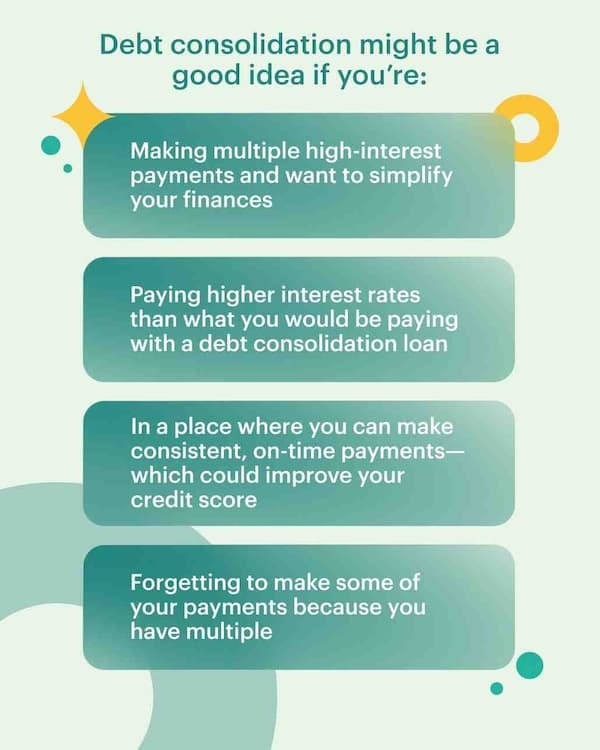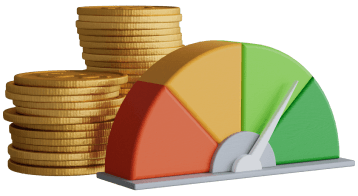Money tips for everyday life
Is Debt Consolidation a Good Idea?
Debt consolidation is a powerful tool that can be used to help manage and simplify your finances. If you're struggling with multiple high-interest debts, consolidating them into a single loan may help make repayment more manageable and potentially save you money on interest. Let’s explore the ins and outs of debt consolidation and when it’s a good idea to consider it as a financial tool.

What is debt consolidation?
Debt consolidation involves taking out a new loan to pay off your existing debts. Instead of juggling multiple payments with varying interest rates and due dates, you'll have just one monthly payment. This can streamline your budgeting process and provide clarity on your debt repayment journey.
Is debt consolidation a good idea?
Debt consolidation can be a good idea if you're looking to simplify your finances and potentially lower your overall interest rate. By combining multiple debts—such as credit cards, personal loans, or medical bills—into a single monthly payment, you can streamline repayment and potentially save money on interest over time. It's especially helpful if you're struggling to keep up with multiple due dates or high-interest rates. However, it’s important to consider the terms of the new loan and your overall financial habits to make sure it’s a smart long-term solution. Here are some ways debt consolidation loans can help you:
- Lower interest rate: If you qualify for a lower interest rate than your current debts’ interest rates, you can save money on interest.
- Simplify payments: Combining multiple debts into one monthly payment can make it easier to manage finances and remain current on payment.
- Fixed repayment timeline: Many debt consolidation options, like Upgrade debt consolidation loans*, have set repayment terms and a clear payoff date you can circle on your calendar.
- Credit score: Debt consolidation loans are installment loans— making consistent, on-time payments on installment loans can positively impact your credit score.
Like with any financial product, there are some factors to consider before taking out a debt consolidation loan. These include:
- Fees: Some debt consolidation loans include fees that might offset potential savings.
- Risk of accumulating more debt: If you consolidate debt but don’t use credit responsibly, you could end up in deeper debt.
- Eligibility: Loan approval, terms, and interest rates depend on various factors, including your credit score, income, and debt-to-income ratio.
When is debt consolidation a good idea?
Everyone’s financial situation is different, but there are some general instances when debt consolidation is a good idea. These are some situations where a debt consolidation loan could make sense for you:

Debt Consolidation Loans through Upgrade
Upgrade’s bank partners provide personal loans that can be used for debt consolidation or credit card refinancing. Here's a general overview of how it works:
- Apply: You can apply for a personal loan through Upgrade online. The application typically involves providing information about your income, employment, credit history, and some other details.
- Approval and Loan Offer: If you qualify, Upgrade will provide you with a loan offer that includes the loan amount, interest rate, repayment term, and monthly payment.
- Funding and Debt Payoff: Once you accept the loan offer and are approved, the funds will typically be disbursed to your bank account. You can then use these funds to pay off your existing debts.
- Single Payment: Moving forward, you'll make a single monthly payment to Upgrade for your debt consolidation loan.
Benefits of Debt Consolidation through Upgrade
Debt consolidation can help streamline your monthly payments and potentially provide lower interest rates. When you consolidate your debts with a personal loan through Upgrade, you get a clear payoff date that you can circle on your calendar. As long as you make consistent and on-time payments, you’ll know exactly when your loan will be paid off.
Personal loans through Upgrade also offer fixed interest rates, meaning your interest rate will stay the same, and you can easily predict how much you’ll pay each month. This can translate into savings while eliminating the surprises of a high-interest credit card with rates that can change any time. Plus, there’s no early repayment fee, so you won’t be penalized for paying off your debt early. See what our customers are saying and read Upgrade debt consolidation reviews.
Ready to consolidate your debt?
Learn more about debt consolidation through Upgrade and apply in minutes online.
*Personal loans made through Upgrade feature Annual Percentage Rates (APRs) of 7.99%-35.99%. All personal loans have a 1.85% to 9.99% origination fee, which is deducted from the loan proceeds. Lowest rates require Autopay and paying off a portion of existing debt directly. Loans feature repayment terms of 24 to 84 months. For example, if you receive a $10,000 loan with a 36-month term and a 17.59% APR (which includes a 13.94% yearly interest rate and a 5% one-time origination fee), you would receive $9,500 in your account and would have a required monthly payment of $341.48. Over the life of the loan, your payments would total $12,293.46. The APR on your loan may be higher or lower and your loan offers may not have multiple term lengths available. Actual rate depends on credit score, credit usage history, loan term, and other factors. Late payments or subsequent charges and fees may increase the cost of your fixed rate loan. There is no fee or penalty for repaying a loan early.


